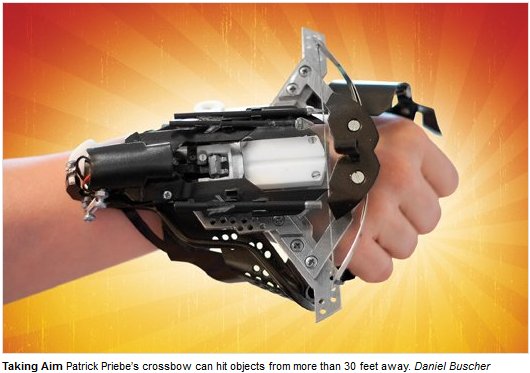A few pictures from RR Picture Archives by Marty Bernard, showing the most Steampunk-appropriate railway vehicle, the McKeen Motor Car. This example is painted in Virginia & Truckee markings:
March 8, 2012
Woolley: We need power tools (and cars) for girls
Over at the Worthwhile Canadian Initiative blog, Frances Woolley marks International Women’s Day:
Goods are becoming ever more specialized. Everything from baby diapers to multivitamins is now dispensed in gender- and age-appropriate models. Yes, it makes sense to have his and hers jeans. But gender appropriate soft-drinks? Does the average guy’s masculinity really need to be bolstered by buying Coke Zero instead of Diet Coke?
The profitability of his and hers products is partly due to price discrimination. The local hair salon charges women more than men because women are prepared to pay $50 or $60 to get their hair cut. Men asked to pay that price would just walk across the road to the barber shop that charges $15 for a short back-and-sides.
[. . .]
Second, gender differentiated power tools. I have small hands. My palm sander doesn’t fit into my palm — it’s more like a two-handed sander. I’d love to get a new drill, but most have such a large grip that I can barely hold them. It’s not just a gender issue — men’s hands come in all sorts of different sizes, too. How can women be expected to share equally in home repair duties when every power tool is the wrong size for their hands?
Finally, I’d like to see more cars built with features that appeal to women. I’ve heard — but I don’t know if this is true — that as soon as a particular model of car is perceived as being “girly,” men won’t buy it. Since men still constitute the majority of car buyers, sales collapse. I’ve heard this offered as an explanation of the lack of cars like the Smart car — two person vehicles that use hardly any gas, and are easy to drive and park on city streets. Smart cars are just too cute, and cute=girly, and girly is the automotive kiss of death. But what is the cost of this pursuit of masculinity?
Cool little crossbow you wear on your wrist
Tom Kelley sent me a link to this article on a neat little device that I suspect violates weapons laws in most jurisdictions:
Last October, after hurting his knee playing hockey, Patrick Priebe was holed up in his apartment near Cologne, Germany, with nothing to do. He was sitting at his computer, staring at his keyboard, when the “Y” key caught his eye. Priebe didn’t see a letter. To him, it looked like a crossbow. Immediately he knew what his next project would be.
[. . .]
To fire, he pulls back the wire, hooks it around a brass block, and places an arrow in the groove. When he flicks the thumb trigger, the brass block drops, the wire pops forward, and the arrow flies.
Army training simulators have come a long way from blanks and oversized firecrackers
Back in my day, we trained with blanks and “arty simulators” which were just oversized firecrackers with an attached whistle (simulating the fall of shot before it exploded). Today, the market for combat simulation is huge and growing fast:
Towards the end of the Gulf war in 1991, an American armoured scout unit in Iraq’s southern desert stumbled upon a much larger elite force of dug-in Iraqi armour. Rather than retreating, the nine American tanks and 12 Bradley fighting vehicles attacked. When the battle ended about 25 minutes later, the Americans had destroyed, by one tally, 28 Iraqi tanks, 16 armoured vehicles and 39 trucks without suffering a single loss. The Battle of 73 Easting, named after a map co-ordinate, is now considered a masterpiece of American tactical manoeuvring. It prompted America’s Department of Defence to build a digital model of the battle for training.
Neale Cosby, the retired army colonel who led the project at the Institute for Defence Analyses in Alexandria, Virginia, says it let commanders watch the action on panoramic screens, select alternate points of view and identify potential improvements in weaponry and tactics. The software was then upgraded so that it could be played like a video game in which “what if” circumstances — foggy night-time fighting against upgraded vehicle armour, say — could be tested. Widely demoed in Washington, DC, during the 1990s, the model kick-started “heavy-duty funding” for combat simulators, says Timothy Lenoir of Duke University, and began a technological revolution that has transformed training and changed the way war is waged.
[. . .]
Motion Reality, a firm based in Marietta, Georgia, that provided some of the technology used to animate “Avatar”, “King Kong” and the “Lord of the Rings” films, has built a mixed-reality “fight simulator”, called VIRTSIM, in conjunction with Raytheon, an American defence contractor. America’s Federal Bureau of Investigation began using the system in January at its academy in Quantico, Virginia, and it has also been sold to a Middle Eastern country. Training in an area the size of a basketball court, 12 commandos wear goggles that display high-resolution 3D images delivered wirelessly […]. Real objects in the training area commingle with computer-generated ones such as buildings and enemies. A virtual insurgent can be realistically displayed in the goggles of trainees who look in his direction — even if everybody is running. Trainees wear electrodes that deliver a painful shock when they are struck by a virtual bullet or bomb blast.
March 7, 2012
Veterans Affairs to face disproportionally big cuts in federal budget
That’s what Sean Bruyea thinks. Here’s his piece in the Globe & Mail:
Prime Minister Stephen Harper calls enlisting in the military the “highest form of public service.” Why then is Veterans Affairs, the department which cares for the Canadian Forces when its members are injured, facing the largest proportional cuts of any other public-service department?
The budget axe has been looming over all federal departments. The current “strategic and operational review” is a euphemism for reigning in a federal public service that is out of control. In the last 10 years, the core public service has grown by 34 per cent (versus 12 per cent at Veterans Affairs) and total government program expenses have swelled by 84 per cent (versus 67 per cent at Veterans Affairs).
Perhaps most galling for Canadians who have passed through two recessions in two decades and have seen no real growth in their earnings, public service salaries have increased by 22 per cent over and above inflation.
Few could credibly argue against the need for Ottawa to be managed better.
Wind turbines are “a technology that isn’t ready for prime time”
Andrew Orlowski on the bad economic and technological decision by the British government to put so much reliance on wind power:
Two studies published this week calculate the astounding cost of Britain’s go-it-alone obsession with using wind turbines to generate so much of the electricity the nation needs.
Both studies make remarkably generous concessions that favour wind technology; the true cost, critics could argue, will be higher in each set of calculations. One study reckons that the UK can still meet its carbon dioxide emissions targets and save £140bn — but only if it dumps today’s inefficient hippie technology. The other puts the potential saving at £120bn — pointing out that the same amount of electricity could be generated using open cycle gas plants at one-tenth the cost of using wind turbines.
“There is nothing inherently good or bad about investing in renewable energy and green technology,” writes economist Professor Gordon Hughes — formerly of the World Bank and now at the University of Edinburgh. “The problem is that the government has decided to back a technology that isn’t ready for prime time, thus distorting the market.”
Hughes’ study — Why is Wind power so expensive? An economic analysis — is published by the Global Warming Policy Foundation today, and simply looks at the costs. The other study, by technical consulting group AF-Mercados, specifically looks at how to reduce CO2 in the cheapest manner — by incurring the least collateral economic damage. It’s called Powerful Targets: Exploring the relative cost of meeting decarbonisation and renewables targets in the British power sector. KPMG originally commissioned the study, but then got cold feet. Both come to similar conclusions: wind is astronomically expensive compared to other sources of energy — and consumers and businesses must pay a high price for the privilege of subsidising such an inefficient technology.
Update, 10 March: A lovely little cartoon from Watts Up With That on this topic:

Robot barf
An amusing article at the Guardian about those hard-to-avoid QR codes:
The idea behind a Quick Response (QR) code is pretty simple, even useful, when applied correctly. You snap a picture of a code and your mobile phone whisks you off to a web page — no typing necessary. The problem is that the vast majority of people have no idea what the codes are, or that they are supposed to interact with them.
Most people look at a QR code and see “robot barf”, but marketers seem to think they are a must-have technology for their advertising campaigns. In their minds, eager consumers wander around with their smartphones, scanning square codes wherever they appear. As a result, the codes appear just about everywhere, and often in some really absurd places.
Being strangely fascinated by their misuse, we decided to collaborate on a Tumblr, wtfqrcodes, to document this ridiculous trend. We started the blog with about a dozen of our own pictures and invited visitors to submit their pictures as well. That’s where we’ve gotten some of our best stuff – we’ve been amazed at some of the places QR codes show up. It’s obvious that most companies just don’t understand the technology … and that’s a recipe for some very funny posts.
Used as they were originally intended, you encounter a bit of robot barf like this one:

You take a picture of it and it opens a URL or provides other encoded information. If it’s in a printed ad or on a billboard, you probably have an idea where it’ll take you. Encountering them outside their “natural habitat”: just the bare QR code with no other information, you don’t know where it’ll take you or what kind of content it’ll provide.
Perhaps the NFL doesn’t want too many people watching the 2009 NFC championship game right now
I retweeted a post from the Daily Norseman yesterday to the effect that the NFL Network had, without warning, pulled a scheduled re-broadcast of the 2009 NFC championship between the New Orleans Saints and the Minnesota Vikings. Gregg Easterbrook perhaps explains why:
The Vikings-Saints NFC title game two years ago may have been where the Saints’ deliberate rule-breaking was worst. Immediately after that game, I wrote, “Saints players came after [Brett] Favre so hard — four times slamming him in ways that invited late-hit or roughing penalties, only two of which were called — Williams [seems to have] told his charges something along the lines of, ‘Pound Favre every time you can; we will take a couple of roughing flags in return for making an old guy worry about the next hit.'”
So did I do a good job by noting two years ago what is suddenly considered obvious? No, I did a terrible job. Yesterday I watched every New Orleans defensive snap of that game and found four, not two, instances in which unnecessary roughness should have been called against the Saints but was not. In retrospect, my column should have led with dirty play by the Saints. The four unnecessary roughness penalties that were not called:
- On the game’s first snap, Favre handed off, turned away from the play and was hammered with a forearm to the chin by New Orleans linebacker Scott Fujita. Not only should a personal foul have been called — Fujita should have been ejected on the game’s first offensive snap. Instead, no call. Scott, were you paid for behaving like a street thug?
- At 6:14 of the first quarter, after Favre released a pass he was hit with a forearm to the chin by safety Roman Harper. No flag. Roman, were you paid for delivering that cheap shot?
- At 4:15 of the first quarter, Favre released a pass and then Darren Sharper slammed him in the chest with a foreman. No flag. Darren, were you paid for having low standards?
- At 13:29 of the second quarter, Favre released a pass and then was hurled to the ground by Bobby McCray. No flag. Bobby, were you paid for doing something you should be ashamed of?
Reviewing the tape, another aspect of the game jumped out at me that I missed when watching live, and so far as I can tell, all sportscasters and commentators missed, too. Beginning midway through the first quarter, whenever Favre handed off, he immediately ran backward 10 yards — to get away from New Orleans late hits.
And the assistant coach who ran the bounty operation? What a piece of work he is:
Gregg Williams has a classy first name, but may be a man of twisted values. Monday on NPR’s “All Things Considered,” Mike Pesca dug up audio of Williams speaking after the Saints’ Super Bowl win. Williams says, “My whole life … I’ve been trying to get people to play nastier.” Can he seriously think lack of aggression is a problem in football? Williams also had this to say about his two sons’ youth football days: “I told their little league coaches my kids will play fast, they’re going to play nasty, they’re going to play tough. Tell the rest of the babies around them to speed up.”
What kind of a man boasts that his sons are nasty and denounces as “babies” 10-year-olds who want to participate in a sport safely? Williams needs to take a long look in the mirror — and by his distorted values, he has forfeited any claim to a leadership role.
The NFL has a bigger problem than figuring out how to discipline the New Orleans Saints players and coaching staff. Perhaps that is why no penalties have yet been announced. The bigger problem for the NFL is that they need to retain the aggression and the passion, yet clearly enforce and be seen to enforce the rules against deliberate attempts to harm other players. If they miss this opportunity, expect politicians (in an election year where media exposure is even more important than usual) to jump in and start trying to do it for them.
March 6, 2012
That’s not a cool business card. This is a cool business card
The Trebucard is a business card sized mini trebuchet. It is designed to fire jumbo paper clips and uses 16 pennies as a counter-weight. Unlike a traditional trebuchet the Trebucard uses the surface it is resting on as a pivot rather than being mounted on a frame.
Nick Gillespie: Short memories and shorter tempers
A very funny trip down a memory lane not quite in the same dimension as we currently occupy:
With Super Tuesday upon us like a plague of 24-hour locusts that threaten not just the GOP but the very fabric of the nation itself (a wool and Lycra blend explicitly forbidden in Leviticus, btw) which is being stripped more bare than the bride by her bachelors even or the dessert bar near closing time at a Golden Corral buffet, it’s as good a time as any to wonder:
Was it just four years ago that The New York Times was running stories about the deleterious effects of a long, drawn-out, bruising fight for the Democratic presidential nod?
[. . .]
Good god, how does the nation ever survive the primary process? Isn’t it a scientific fact that nobody has ever won the presidency after having gone through a difficult nominating race? Obama was forced to visit all 57 states (by his count) multiple times until he kept fainting on stage from exhaustion like that guy from the Black Crowes who used to be famous.
After all, hasn’t a poll just scientifically proved that the GOP is hurting its “brand” (you know: Depends-wearing, anti-government crackers who only leave their houses on the Medicare-purchased personalized motor scooters to cruise to the mailbox to pick up their Social Security checks and oil-company dividend checks) by not immediately appointing the candidate most likely to get smoked by Obama in November?
The only subgroup of Americans who have weaker memories than high school seniors (99 percent of whom contend that the War of 1812 was fought between the Crips and the Bloods over the last Cabbage Patch doll between 1983-1986) are political journalists, many of whom, you may recall, took Donald Trump and Herman Cain seriously.
Michael Kinsley: Of course it’s insincere
I don’t listen to Rush Limbaugh and I’m not likely to start listening in the near future, so my concern about “Slutpocalypse” is neither deep nor lasting. Limbaugh used the term “slut” to describe a Georgetown law student who was pleading for free or subsidized birth control. He then was forced to apologize, and the apology was deemed insincere by media commentators far and wide. Michael Kinsley points out that they went about it in the wrong way to garner a sincere apology:
The people who want to drive Rush Limbaugh off the air are not assuaged or persuaded by his apology over the weekend. They say he was not sincere: He only apologized, for calling a Georgetown University law student a “slut” and a “prostitute,” because of pressure from advertisers.
Well, of course he wasn’t sincere. And of course he was only apologizing to pacify advertisers — who were getting pressured to pressure Limbaugh by these very critics. Oh, there might have been a political calculation, too, that he’d gone too far for the good of his ratings or his celebrityhood. But any apology induced in these circumstances is almost by definition insincere. You can’t demand a public recantation and then expect sincerity along with the humble pie. If they wanted a sincere apology, Limbaugh’s critics would have had to defend his right to make these offensive remarks, and then attempt to change his mind using nothing but sweet reason. Go ahead and try.
[. . .]
Of course, the insincerity is on both sides. The pursuers all pretend to be horrified and “saddened” by this unexpected turn of events. In fact, they are delighted. Why not? Their opponent has committed the cardinal political sin: a gaffe.
A gaffe, as someone once said, is when a politician tells the truth. This is a bit imprecise. The term “politician” covers any political actor, certainly including Rush. And the troublesome statement needn’t be the truth, as it certainly wasn’t in this case: more like “the truth about what he or she is really thinking.” The typical gaffe is what they used to call a “Freudian slip.” But, with all due respect to Freud, why should something a politician says by accident — and soon wishes he or she never said, whether true or not — automatically be taken as a better sign of his or her real thinking than something he or she says on purpose?
H/T to Radley Balko for the link.
This is why I haven’t been covering the robocallpocalypse
Margaret Wente in the Globe & Mail brings a sense of proportion to the robo-call “crisis” in Canadian politics:
What’s happened to my country? I went away for a couple of weeks and all hell broke loose. I came back to find that someone named Poutine stole the last election. At first I thought this was a typo, that they meant Putin. But no. It turns out that Russia is a shining beacon of democracy compared to Canada. Apparently, our country has been hijacked by “the most comprehensive electoral fraud in our nation’s history” (Pat Martin, NDP critic). Voter suppression — lying, cheating and general chicanery — has driven us into “uncharted waters” (Bob Rae, Liberal Leader).
I certainly don’t wish to make light of voter fraud. But this fraud seems to have been engineered by the Keystone Kops. Not a single voter claims to have been prevented from voting. No ballot boxes appear to have been stuffed. Nobody was fraudulently elected. There weren’t even any hanging chads. Elections Canada says 31,000 Canadians have complained, but the vast majority of these complaints (“somebody called me at 10 p.m.”) seem trivial.
The dirty trickster at the heart of this evil scheme turns out to be someone with the nom de plume of Pierre Poutine (real identity unknown). Mr. Poutine and his henchmen were not personally directed by Stephen Harper but are widely thought to have been channelling him. In Guelph, Ont., they engineered a bunch of robo-calls that directed people to show up at non-existent voting stations. This tactic was evidently intended to discourage people who didn’t support the Conservatives from voting. It was so effective that the Liberal candidate won by a margin of 11 per cent.

 Click to see full size image at RR Picture Archives
Click to see full size image at RR Picture Archives



